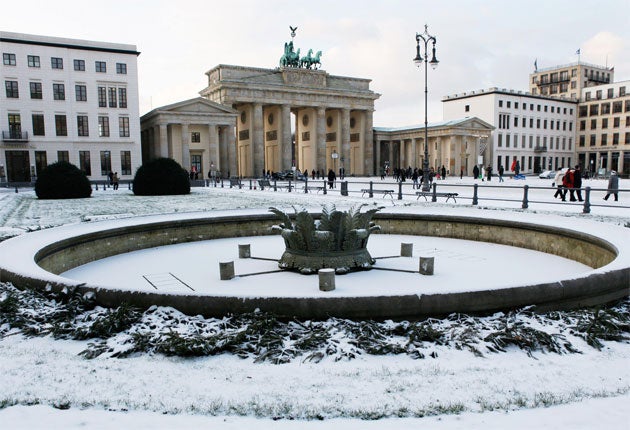Snow and ice: How other countries cope

Your support helps us to tell the story
From reproductive rights to climate change to Big Tech, The Independent is on the ground when the story is developing. Whether it's investigating the financials of Elon Musk's pro-Trump PAC or producing our latest documentary, 'The A Word', which shines a light on the American women fighting for reproductive rights, we know how important it is to parse out the facts from the messaging.
At such a critical moment in US history, we need reporters on the ground. Your donation allows us to keep sending journalists to speak to both sides of the story.
The Independent is trusted by Americans across the entire political spectrum. And unlike many other quality news outlets, we choose not to lock Americans out of our reporting and analysis with paywalls. We believe quality journalism should be available to everyone, paid for by those who can afford it.
Your support makes all the difference.Berlin
Tony Paterson
With temperatures plummeting to below -30C, even Germany has been struggling to cope with the severe winter weather.
A record low of -33.6C was recorded in an Alpine region of Bavaria at the weekend, but even in flatter, northern areas such as Lower Saxony and the Rhineland, temperatures dropped below -20C. Several places recorded their lowest December temperatures in more than 30 years.
The ice and snow caused multiple accidents on nearly all of the country's motorways. The German automobile association said yesterday that it had received a record 28,654 emergency calls from motorists on Monday night, and rail operator Deutsche Bahn also reported serious delays and cancellations.
But it was Frankfurt airport, Europe's second largest hub after Heathrow, that suffered the most chaos. Snow and frozen runways forced the cancellation of all flights on Monday night. At least 3,000 passengers had to spend the night in the terminals. Yesterday more than 3,000 airport staff were working round the clock to reopen the runways. Berlin's main Tegel airport was also shut down for over an hour yesterday after a sudden thaw brought rain and so-called "blitz ice" or freezing rain.
USA
David Usborne
They were digging out cars in the streets of Manhattan early on Sunday after a 10in blanketing of snow, yet within hours of the last flakes falling all the main roads through the city were so clear that drivers could have been forgiven for thinking the storm had never happened.
It helps that this storm came early in the season and the snow-clearing budgets are still flush. But wherever snow falls regularly in America they are pretty efficient at dealing with it. (A freak flurry in Miami would doubtless cause havoc.)
The worst place to be at the weekend was an East Coast airport: thousands of flights were cancelled by the airlines. Nor did you want to be a shopkeeper. The numbers are not in yet but economists fear that the pre-Christmas storm may have badly dented retail figures at the worst possible time.
It was a record snowfall for some parts of the East Coast, for instance in Washington DC, but all is more or less back to normal now as the Christmas travel rush begins in earnest.
But the folks of the Midwest may not be so lucky. Forecasters predict that parts of the region are about to be swamped with snow and ice beginning later today.
Siberia
Shaun Walker
Even in a country famous for its long, harsh winters, Yakutsk is a byword for meteorological extremes, and is the coldest major settlement in the world. The mercury is set to hover around -33C in the coming days but that is relatively mild – the 250,000 inhabitants regularly have to endure -40C at this time of year.
Six time zones away from Moscow and only properly accessible by plane, all the buildings in the city are built on stilts that burrow deep into the ground, so that warmth from the buildings does not melt the permafrost on which the city balances.
Armies of snow-clearing machines and street sweepers deal with heavy snowfalls, as in all Russian cities. Yet even in the depth of winter, when a surreal bluish haze hangs over the city, schools stay open, buses run and people go about their daily business.
Yakutsk itself sits on the mighty River Lena. There are no bridges, so in winter an ice road is constructed across the river complete with several lanes and road signs.
When I last visited, one newspaper editor told me that during the Cold War, locals would joke that to destroy Yakutsk, there was no need to drop a nuclear bomb on the city. It would be enough just to turn the heating off for a couple of hours.
Join our commenting forum
Join thought-provoking conversations, follow other Independent readers and see their replies
Comments